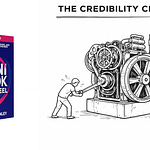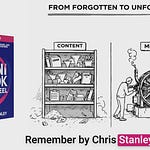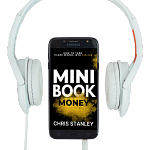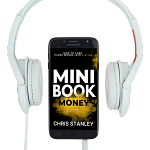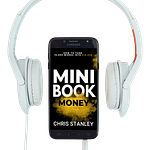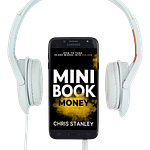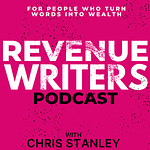🎙️ Episode 4: How to Choose the Right Problem for Your Book (The Power Promise Series, Part 1)
Before you choose a title…
Before you write a word…
Before you even decide what kind of book to write…
You need one thing: a clear Power Promise to your reader. And it starts with solving the right problem.
In this episode, host Chris Stanley introduces the P.O.W.E.R. framework — starting with the “P”
✅ The Problem your book solves
You’ll learn:
Why every successful book is a problem-solving tool
The big difference between legacy nonfiction and mini books
How to break down your audience’s big challenge into a quick-win, fast-read, review-worthy mini book
Three quick tips to pick the right problem:
Bigger is better
Smaller is faster
First-in-series wins
This episode kicks off a multi-part series that will help you nail your promise, dial in your book’s positioning, and actually get it done.
🧠 Revenue Writers don’t just publish books. They solve problems.
Hey, revenue writers. Welcome back to the Revenue Writers Podcast. This is your host, Chris Stanley. This is where we turn words into wealth. And so what I'm gonna talk to you about today is, okay, maybe I've convinced you need to write a book. I. Make it a mini book, number one. That's what we're gonna, that's what I'm not gonna beg you to, but before you even decide whether you're gonna do a mini book or a legacy nonfiction book or anything, and you decide you're gonna do a book, the very first thing you gotta set up and decide on and figure out.
Is what is your power promise to your reader? And so over the next few episodes, I'm gonna be breaking this down in five minute chunks to really make sure that you understand how to set this up. Because if you can do this right, your book, no matter how poorly written could potentially be a success because you've made a serious power promise to your reader.
And this is the number one thing you could do to make your book successful. And so what a power promise to your reader is it, is, it's what you're telling the reader you're going to help them do. And this is an acronym. And so P is what is the problem the reader faces. O what is the offer of the solution?
Two, the problem w words that create a great hook in your Title E is the expectation of transformation that's stated in your subtitle. And then R, you reveal the genre and the vibe of an overall theme of your book with your cover. And so that's what we're gonna bring down over these next few episodes.
So let's jump into P. The Problem and offer of solution is the P and the O. But let's talk about the problem. Every good business and every good book starts by doing what? Solving a problem for a customer, for a reader. And so if you're like, I don't know what to write about Chris. I know my niche. I work in plumbing.
I, I help people know how to diet healthily, whatever your genre and niche are. But I just don't know what book I should pick to write about. You need to really sit and think what is the primary problem you are trying to help solve. For me, I'm trying to help solve all these wonderful people in the world who start to write a book, want to write a book, aspire to write a book to help build their business.
And they never finish. Or if they do finish their readers never finish the book. And so their books don't accomplish what they wanted to accomplish. So it's just incompletion of a legacy nonfiction book for me is the big problem either by the author or by the reader. And so you need to choose the problem.
That's the lens at which I'm looking at everything. It's okay, they're not finishing the book as the author. They're not finishing the book. As the reader, what's the problem here? What's the common problem? And so that is what consumes me. You need to find out what consumes you, what problem is consuming you, and then break that down into smaller steps.
So for me here an author not finishing their book what's the problem? One, they don't know what to write about. I. What am I talking about today? How to know what to write about, right? So if you don't know what to write about, you need to figure out the problem you're solving. But if you break your big problem into smaller chunks, it's I don't know what to write about.
I don't know how to pick a title and subtitle. I don't know how to outline a book. I don't know how to write once I have it outlined. I don't know how to create a cover. I don't know how to, you could break into all the excuses we make of why we don't write and publish books. Those become potential many books because a many book is solving one singular.
Problem. Not the huge big problem, but all just one singular domino of all the problems that they have. And that's a big shift from mini books to legacy nonfiction books, is you're just picking that one problem and you're knocking it over. And that allows it to be brief, concise, and powerful. It gives the reader a quick win rather than having to spend weeks with your book on the nightstand, which.
Good luck trying to keep their attention for that long. Instead, in an hour or so, they're having a quick win because of your mini book. So figure out first things first. What's the problem you're solving? And here's three quick tips to choosing it. One bigger is better. The bigger the problem, or the pool of people that have the problem, the better.
Two. Smaller is faster. Like I was saying, the smaller the domino you're knocking over, the better because they can have a quicker win, which gets you quicker reviews, which, even having a quicker book gets you, gets them done faster and new reviews and the word of mouth starts moving faster.
And then lastly, three, when choosing a problem, it's a first in series bonus. So if the first problem your reader has is I don't know what my niche is, or I don't know what to write about, or I don't know how to choose a diet, bam, that should be your first problem, knock over the first problem and it starts that domino chain and it's a whole lot easier to get started.
So those are three tips to help you choose your problem. If you're trying to decide between all of them, bigger is better, smaller is faster, and then the first in series bonus, hope that helps choose your problem and you'll be well on your way to writing your book.





